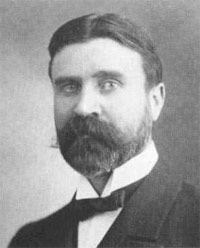In other words, medical literature swarms with facts, of which the most part are periodically produced with the most tiresome monotony; these are called observations and clinical facts; a number of laborers consider and reconsider particular questions of pathology or therapeutics that is called original research. The mass of such labors and facts is enormous; no reader can wade through them but no one has any general doctrine. The most general doctrine that exists is the *doctrine of homoeopathy! This is strange and lamentable; a disgrace to medicine but such is the fact.”
Principles and Organizations. A common mistake, and one of the greatest that can be made, is that of rendering to organizations the spiritual submission that belongs in the highest degree to principles only.
Organizations are formed for the purpose of maintaining and advancing principles, but it often happens that in the stress of building and maintaining the organization the principles are pushed into the background, neglected or forgotten. The man too often becomes the slave of the machine instead of its master. The organization becomes a frankenstein which destroys its creator. Worse even than the mere neglect or forgetting, is the wilful corruption and perversion of principles which is often the result of the mad struggle for organization prestige, power and position. Moreover, individuals connected with or responsible for the success of the organization are easily infected with the germ of selfish personal ambition. They come to regard their official contract with it as a through ticket on the Limited to the city of their dreams.
Out of these conditions, which it is not necessary to illustrate or enlarge upon, arise some of the most serious problems of the world. Organizations civil, military, medical, political, social, religious and educational may and often do become corrupt, mercenary, tyrannical; a menace to liberty and progress; enemies to the principles they are supposed to represent and agents of compulsion.
The individual truth-seeker must therefore keep his eyes open and walk circumspectly if he would keep in the path of progress, maintain his mental integrity and preserve liberty of thought, speech and action.
It has come to pass that individual liberty is calculated only in percentages now. The increasing pressure of official and institutional compulsion encircles us. The moral compulsion of the “Drive” is but a short remove from the physical compulsion of the “Draft”. Metaphorically the internment camp, the prison the dead wall and the firing squad are just beyond.
The world is in a state of war. It is a “War of the Worlds” The political world, the industrial world, the social world, the religious world, the medical world-organizations all are torn by war because importance has been attached to organizations that belongs only to principles.
Organizations like men are subject to disease, decay and death. When they become corrupt they die, for corruption is elementary death. Institutions, nations, whole civilizations have died, disappeared and been forgotten until brought to light by the excavations of archeologists centuries or perhaps millenniums afterwards. But principles never die.
Principles are essential truth, represented by or corresponding to facts. The essential characteristic of truth is its steadfast conformity to law and order. Truth is Life, Mind, Spirit: absolute, infinite and immortal. Organisms in which truth embodies itself are transitory. They change, decay and pass away, but life is continuous. Truth, like the fabled phoenix, burns itself on the altar and arise from its own ashes.
Homoeopathy, as already pointed out, has a two-fold existence as an institution or organization and in the individuals who make up its following. The spirit and principles of homoeopathy have never been and never can be solely in the keeping of any institution, for organizations are continually changing and dying.
Individuals unite in small or great societies and work together harmoniously for a time but not for long. Disagreements arise, they dissolve their original relations and form others; but the work goes on because the Spirit of Truth always draws together those of like minds for the attainment of a common object. At critical periods and in the long run it is always the individual who preserves passes on and perpetuates the truth.
Upon individuals, therefore, as living embodiments and representatives of the truth, rests a great and solemn responsibility. No man can shift his personal responsibility to an organization. As a creator and member of organizations he does not cease to be an individual trustee, nor should he become slavishly subject to the organization. The creator is greater than the creature. He may work in or by means of an organization, but he may not work for an organization, lest he presently find himself in bondage to a creature which has become corrupt.
It follows that our greatest concern as followers of Hahnemann and representatives of homoeopathy is primarily with individuals with men and principles rather than with organizations. We will build men into organizations and keep the organizations clean and useful as well as long as we can; but let us be sure that we build *principles into men.
Nature puts man first. Truth is not revealed to institutions, but to men. Let us have done with fictions and deal with realities. An organization is a machine; an inanimate, soulless thing; a figment of the imagination; a creature of the law, deriving its existence and seeming vitality only from the individual men who compose it; ceasing to be when their relations are dissolved. Man is a real living, thinking human being, “made in the image and likeness of God” an individual embodiment and personification of a portion of the Infinite and Universal Mind, endowed with the ability to exercise creative power within his appointed sphere and destined for immortality. Let him exercise it in liberty, using organizations judiciously but not becoming enslaved by them.

